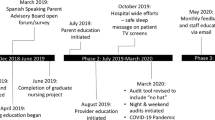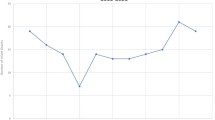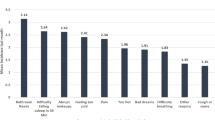Abstract
Sleep deprivation is a major challenge for neonatologists, who face increasing demands in the complex healthcare system. Current neonatal intensive care unit (NICU) schedule models often include extended shifts and overnight call, which can lead to sleep deprivation. This lack of sufficient sleep poses adverse health risks to neonatologists and can impair cognitive function, which increases the risk of medical errors and compromises patient safety. This paper proposes reducing shift durations and implementing policies and interventions to reduce fatigue among neonatologists and improve patient safety. The paper also offers policymakers, healthcare leaders, and NICU physicians valuable insights on potential ways to promote the health of the neonatologist workforce and safety in the NICU.
This is a preview of subscription content, access via your institution
Access options
Subscribe to this journal
Receive 12 print issues and online access
$259.00 per year
only $21.58 per issue
Buy this article
- Purchase on Springer Link
- Instant access to full article PDF
Prices may be subject to local taxes which are calculated during checkout

Similar content being viewed by others
References
Barger LK, Cade BE, Ayas NT, Cronin JW, Rosner B, Speizer FE, et al. Extended work shifts and the risk of motor vehicle crashes among interns. N. Engl J Med. 2005;352:125–34.
Joiner WJ. The Neurobiological Basis of Sleep and Sleep Disorders. Physiology. 2018;33:317–27.
Institute of Medicine Committee on Optimizing Graduate Medical Trainee H, Work Schedule to Improve Patient S. In: Ulmer C, Miller Wolman D, Johns MME (eds). Resident Duty Hours: Enhancing Sleep, Supervision, and Safety. National Academies Press (US) Copyright 2009 by the National Academy of Sciences. All rights reserved: Washington (DC): Institute of Medicine Committee on Optimizing Graduate Medical Trainee H; 2009.
Nasca TJ, Day SH, Amis ES Jr, Force ADHT. The new recommendations on duty hours from the ACGME Task Force. N. Engl J Med. 2010;363:e3.
Britt LD, Sachdeva AK, Healy GB, Whalen TV, Blair PG, Members of ACSTFoRDH. Resident duty hours in surgery for ensuring patient safety, providing optimum resident education and training, and promoting resident well-being: a response from the American College of Surgeons to the Report of the Institute of Medicine, "Resident Duty Hours: Enhancing Sleep, Supervision, and Safety". Surgery. 2009;146:398–409.
Bolster L, Rourke L. The Effect of Restricting Residents’ Duty Hours on Patient Safety, Resident Well-Being, and Resident Education: An Updated Systematic Review. J Grad Med Educ. 2015;7:349–63.
Ahmed N, Devitt KS, Keshet I, Spicer J, Imrie K, Feldman L, et al. A systematic review of the effects of resident duty hour restrictions in surgery: impact on resident wellness, training, and patient outcomes. Ann Surg. 2014;259:1041–53.
Weaver MD, Landrigan CP, Sullivan JP, O’Brien CS, Qadri S, Viyaran N, et al. National improvements in resident physician-reported patient safety after limiting first-year resident physicians’ extended duration work shifts: a pooled analysis of prospective cohort studies. BMJ Qual Saf. 2023;32:81–89.
Field E, Lingard L, Cherry R, Van Koughnett JA, DeLuca S, Taylor T. The fatigue paradox: Team perceptions of physician fatigue. Med Educ. 2021;55:1388–93.
Cuevas Guaman M, Miller ER, Dammann CEL, Bishop CE, Machut KZ. Neonatologist staffing models: urgent change is needed. J Perinatol. 2022;42:1556–7.
Mercurio MR. Neonatology’s race to the bottom: RVUs, cFTEs, and physician time. J Perinatol. 2021;41:2561–3.
Borbely AA, Achermann P. Sleep homeostasis and models of sleep regulation. J Biol Rhythms. 1999;14:557–68.
Borbely AA, Daan S, Wirz-Justice A, Deboer T. The two-process model of sleep regulation: a reappraisal. J Sleep Res. 2016;25:131–43.
Amicucci G, Tempesta D, Salfi F, D’Atri A, Viselli L, De Gennaro L, et al. The effect of 5 nights of sleep restriction on empathic propensity. J Sleep Res. 2021;30:e13325.
Li J, Zhou Y, Zhang X, Wang Q, Zhang L. Effects of total sleep deprivation on execution lapses during vigilance tasks. Chronobiol Int. 2022;39:1624–39.
Barger LK, Weaver MD, Sullivan JP, Qadri S, Landrigan CP, Czeisler CA. Impact of work schedules of senior resident physicians on patient and resident physician safety: nationwide, prospective cohort study. BMJ Med. 2023;2:e000320.
Feingold CL, Smiley A. Healthy Sleep Every Day Keeps the Doctor Away. Int J Environ Res Public Health. 2022;19:1074.
QuickStats: Percentage of Currently Employed Adults Aged ≥ 18 Years Who Reported an Average of ≤6 h of Sleep per 24-Hour Period, by Employment Category — National Health Interview Survey, United States, 2008–2009 and 2017–2018. MMWR Morb Mortal Wkly Rep; 2020. p. 504.
Hirshkowitz M, Whiton K, Albert SM, Alessi C, Bruni O, DonCarlos L, et al. National Sleep Foundation’s updated sleep duration recommendations: final report. Sleep Health. 2015;1:233–43.
Blackwelder A, Hoskins M, Huber L. Effect of Inadequate Sleep on Frequent Mental Distress. Prev Chronic Dis. 2021;18:E61.
Grandner MA. Sleep, Health, and Society. Sleep Med Clin. 2022;17:117–39.
Robbins R, Quan SF, Weaver MD, Bormes G, Barger LK, Czeisler CA. Examining sleep deficiency and disturbance and their risk for incident dementia and all-cause mortality in older adults across 5 years in the United States. Aging (Albany NY). 2021;13:3254–68.
Zhu G, Cassidy S, Hiden H, Woodman S, Trenell M, Gunn DA, et al. Exploration of Sleep as a Specific Risk Factor for Poor Metabolic and Mental Health: A UK Biobank Study of 84,404 Participants. Nat Sci Sleep. 2021;13:1903–12.
Huang YM, Xia W, Ge YJ, Hou JH, Tan L, Xu W, et al. Sleep duration and risk of cardio-cerebrovascular disease: A dose-response meta-analysis of cohort studies comprising 3.8 million participants. Front Cardiovasc Med. 2022;9:907990.
Trockel MT, Menon NK, Rowe SG, Stewart MT, Smith R, Lu M, et al. Assessment of Physician Sleep and Wellness, Burnout, and Clinically Significant Medical Errors. JAMA Netw Open. 2020;3:e2028111.
Gates M, Wingert A, Featherstone R, Samuels C, Simon C, Dyson MP. Impact of fatigue and insufficient sleep on physician and patient outcomes: a systematic review. BMJ Open. 2018;8:e021967.
Cernadas Curotto P, Sterpenich V, Sander D, Favez N, Rimmele U, Klimecki O. Quarreling After a Sleepless Night: Preliminary Evidence of the Impact of Sleep Deprivation on Interpersonal Conflict. Affect Sci. 2022;3:341–52.
Maranges HM, McNulty JK. The rested relationship: Sleep benefits marital evaluations. J Fam Psychol. 2017;31:117–22.
Ben Simon E, Vallat R, Barnes CM, Walker MP. Sleep Loss and the Socio-Emotional Brain. Trends Cogn Sci. 2020;24:435–50.
Wilson SJ, Jaremka LM, Fagundes CP, Andridge R, Peng J, Malarkey WB, et al. Shortened sleep fuels inflammatory responses to marital conflict: Emotion regulation matters. Psychoneuroendocrinology. 2017;79:74–83.
Krause AJ, Simon EB, Mander BA, Greer SM, Saletin JM, Goldstein-Piekarski AN, et al. The sleep-deprived human brain. Nat Rev Neurosci. 2017;18:404–18.
Arnedt JT, Owens J, Crouch M, Stahl J, Carskadon MA. Neurobehavioral performance of residents after heavy night call vs after alcohol ingestion. JAMA. 2005;294:1025–33.
Williamson AM, Feyer AM. Moderate sleep deprivation produces impairments in cognitive and motor performance equivalent to legally prescribed levels of alcohol intoxication. Occup Environ Med. 2000;57:649–55.
Bell T, Sprajcer M, Flenady T, Sahay A. Fatigue in nurses and medication administration errors: A scoping review. J Clin Nurs. 2023. https://doi.org/10.1111/jocn.16620.
Gunderson CG, Bilan VP, Holleck JL, Nickerson P, Cherry BM, Chui P, et al. Prevalence of harmful diagnostic errors in hospitalised adults: a systematic review and meta-analysis. BMJ Qual Saf. 2020;29:1008–18.
Putra HA, Park K, Yamashita F. Sex Differences in the Correlation between Fatigue Perception and Regional Gray Matter Volume in Healthy Adults: A Large-Scale Study. J Clin Med. 2022;11:6037.
Wylie GR, Pra Sisto AJ, Genova HM, DeLuca J. Fatigue Across the Lifespan in Men and Women: State vs. Trait. Front Hum Neurosci. 2022;16:790006.
Akerstedt T, Discacciati A, Miley-Akerstedt A, Westerlund H. Aging and the Change in Fatigue and Sleep - A Longitudinal Study Across 8 Years in Three Age Groups. Front Psychol. 2018;9:234.
Kecklund G, Axelsson J. Health consequences of shift work and insufficient sleep. BMJ. 2016;355:i5210.
Song C, Zhang R, Wang C, Fu R, Song W, Dou K, et al. Sleep quality and risk of cancer: findings from the English longitudinal study of aging. Sleep. 2021;44:zsaa192.
Killgore WDS, Balkin TJ, Yarnell AM, Capaldi VF 2nd. Sleep deprivation impairs recognition of specific emotions. Neurobiol Sleep Circadian Rhythms. 2017;3:10–16.
Staes L, Godfrey J, Saliceto R, Yegidis R, Byrnes D. FTA Standards Development Program: Medical Fitness for Duty and Fatigue Risk Management. No. FTA Report No. 0223. United States. Department of Transportation. Federal Transit Administration; 2022. Available online at https://www.transit.dot.gov/sites/fta.dot.gov/files/2022-07/FTA-Report-No-0223.pdf. Accessed on 07/07/2023.
Lakshminrusimha S, Olsen SL, Lubarsky DA. Behavioral economics in neonatology-balancing provider wellness and departmental finances. J Perinatol. 2022;42:683–8.
The impact of advanced practice nurses’ shift length and fatigue on patient safety: position statement #3057. Adv Neonatal Care 2012;12:189–200.
Walker M. Why we sleep. Harlow, England: Penguin Books; 2018.
Author information
Authors and Affiliations
Contributions
All manuscript contributions were from RMMA.
Corresponding author
Ethics declarations
Competing interests
The author declares no competing interests.
Additional information
Publisher’s note Springer Nature remains neutral with regard to jurisdictional claims in published maps and institutional affiliations.
Rights and permissions
Springer Nature or its licensor (e.g. a society or other partner) holds exclusive rights to this article under a publishing agreement with the author(s) or other rightsholder(s); author self-archiving of the accepted manuscript version of this article is solely governed by the terms of such publishing agreement and applicable law.
About this article
Cite this article
McAdams, R.M. Fatigue and fallibility: the perils of prolonged shifts for neonatologists. J Perinatol 43, 1530–1534 (2023). https://doi.org/10.1038/s41372-023-01718-0
Received:
Revised:
Accepted:
Published:
Issue Date:
DOI: https://doi.org/10.1038/s41372-023-01718-0
This article is cited by
-
“On duty, not on call: time to rethink Neonatal Intensive Care Unit attending hours”
Journal of Perinatology (2023)



